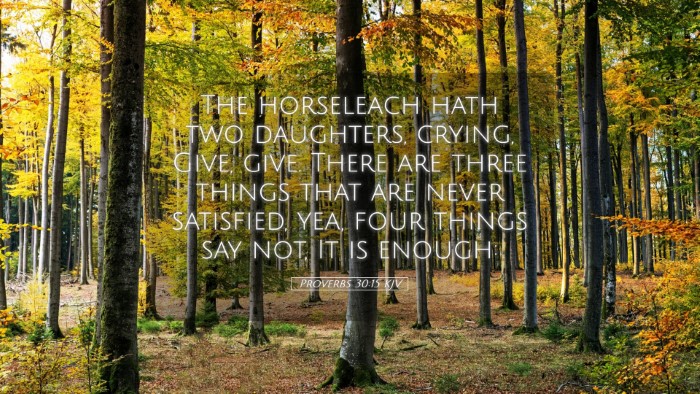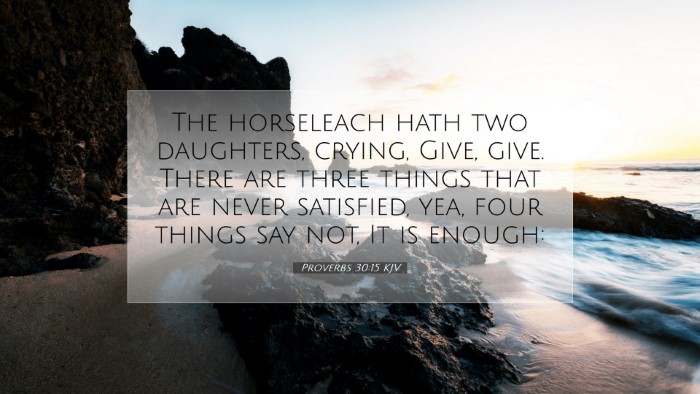Commentary on Proverbs 30:15
Proverbs 30:15 states, "The leech has two daughters: Give, give!" There are three things that are never satisfied; four that never say, 'Enough!' This verse serves as a poignant reflection on insatiability and greed within the human experience.
Introduction
The Book of Proverbs is replete with wisdom concerning human behavior, morality, and the nature of various entities. Proverbs 30, attributed to Agur son of Jakeh, embodies observations relevant to human tendencies—particularly concerning greed and the unending desire for accumulation.
The Leech and Its Daughters
The imagery of the leech is striking. Matthew Henry indicates that the leech, known for its bloodsucking nature, symbolizes greed that admits no limit. Its “daughters” echo the command to “give” without cessation, representing the insatiable appetite of human desire. The wording implies a compelling grasp on resources and wealth, relentlessly seeking more.
Albert Barnes adds that this depiction serves not just as a metaphor for dissatisfaction but also as a call to examine our own voracious tendencies. The emphasis on the word "give" accentuates the insatiable demands that persist, symbolizing how the lure of greed perpetually shouts for fulfillment.
Things That Are Never Satisfied
Following the statement concerning the leech, the proverb introduces three entities that are "never satisfied." A crucial element within this text is the concept of dissatisfaction innate to certain aspects of existence:
- Sheol (the grave): Matthew Henry highlights the grave's metaphorical representation of endless consumption—whether through physical death or spiritual loss.
- The barren womb: Adam Clarke notes that the longing for progeny can create a cycle of yearning that is never fulfilled, evoking deep emotional resonance.
- The earth that is not satisfied with water: This image reinforces the unquenchable thirst for sustenance and prosperity, resulting in ecological parallels.
Additionally, The Proverbial Fourth
The verse notably continues, declaring, "four that never say, 'Enough!'" The addition of a fourth entity is intriguing. Albert Barnes notes how this third category is often considered as the fire, which signifies destruction and the consuming nature of unchecked desires. This imagery prods readers to reflect on the spiritual ramifications of indulgence without boundaries.
Theological Implications
The underlying message of Proverbs 30:15 echoes throughout Scripture—the theme of human greed, its dangers, and the call for contentment. Adam Clarke comments on the moral imperative to remain vigilant against these tendencies. Each of the entities mentioned in this proverb serves as a dire warning, urging both individual and communal reflection about the nature of consumption.
Application for Life and Ministry
For pastors and theologians, Proverbs 30:15 offers fertile ground for sermons and teachings. It invites exploration of the broader themes of contentment, stewardship, and the spiritual implications of greed. Here are some considerations:
-
Self-Examination: Pastors might encourage congregants to engage in self-reflection regarding their material desires and the influences of societal pressures that fuel greed.
-
Encouraging Generosity: Following the leech’s demand for 'give', ministries can highlight the significance and biblical basis for generosity as an antidote to insatiability.
-
Promoting Satisfaction in Christ: The teaching can steer toward finding ultimate fulfillment in spiritual pursuits rather than material gain, leading to a holistic understanding of worship and devotion.
Conclusion
Proverbs 30:15 serves as a powerful reminder of the never-ending quest for more—a theme woven throughout the fabric of human history. The wisdom presented begs individuals and communities to confront their inherent avarice and to cultivate a spirit of gratitude and contentment. In navigating the complexities of life, this proverb remains a timeless antidote to the insatiable demands of the human heart.


